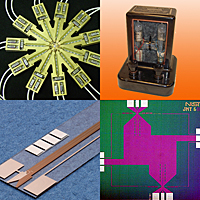Mar 30 2011
On April 8, 2011, the scientific community will celebrate the centennial of the discovery of superconductivity-the ability of certain materials to conduct electricity without resistance when cooled below a specific temperature.
Quantum voltage standards are among the successful practical applications of superconductivity, so to mark the anniversary, the National Institute of Standards and Technology (NIST) has created an online museum highlighting important accomplishments and historical images from the voltage standards program.

Superconductivity was first discovered on April 8, 1911, by the Dutch physicist Heike Kamerlingh Onnes. Over four decades, NIST has developed a series of voltage standards based on superconducting Josephson junctions. The standards are used worldwide by industry, government and military laboratories to calibrate voltmeters-common instruments for applications ranging from the electric power grid to consumer electronics to advanced military equipment.
The museum is available at http://www.nist.gov/pml/history-volt/.